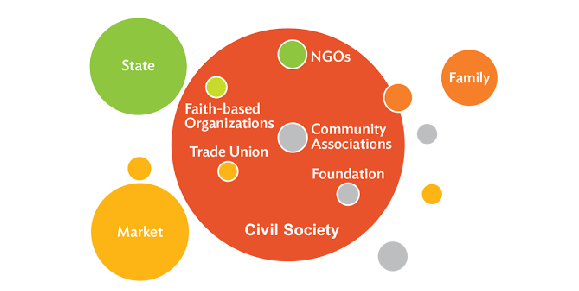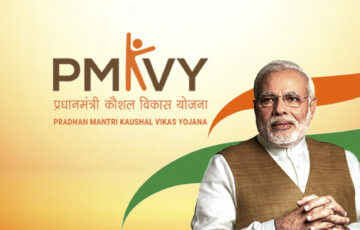Civil society
Relevance
- GS Paper 2 Important aspects of governance.
- Tags: #governance #civilsocieties #ngo #goodgovernance.
What is civil society?
Civil society encompasses a diverse range of entities, including organizations, community groups, non-governmental organizations (NGOs), labor unions, indigenous groups, charitable organizations, faith-based groups, professional associations, and foundations, as defined by the World Bank.
The term ‘Civil Society’ gained global prominence in the 1980s, primarily as it became associated with non-state movements that resisted authoritarian regimes, particularly in Eastern Europe and Latin America.
It’s important to note that civil society should not be confused with non-governmental organizations (NGOs). While NGOs are a subset of civil society, they often play a pivotal and, at times, leading role in promoting citizen engagement in socio-economic development, political processes, and the shaping or influencing of policies.
Civil society is a more extensive concept, encompassing all types of organizations and associations that operate outside the domains of the state and the market.
Types of Civil societies
Based on the 2nd ARC Classification
- Registered Societies formed for specific purposes: These are organizations established for particular objectives, such as cultural, educational, or religious purposes. Eg. Indian Medical Association (IMA).
- Charitable organizations and Trusts: These entities are focused on philanthropic activities, providing aid, and supporting various social causes.
- Local Stakeholder Groups, Microcredit and Thrift Enterprises, SHGs (Self-Help Groups): These include grassroots organizations, microcredit institutions, and SHGs that empower local communities, especially in rural areas. Eg. Grameen Bank in Bangladesh.
- Professional Self-Regulatory Bodies: These organizations are often industry-specific and work to maintain professional standards and ethics within their respective sectors. Eg. Bar Council of India.
- Cooperatives: Cooperatives are community-driven organizations where members collaborate for mutual benefit, often in agriculture, finance, and consumer sectors. Eg. Amul.
- Bodies without formal organizational structure: These are informal groups and movements that mobilize people for various social, political, or environmental causes. Eg. Community-based initiatives such as “Clean-Up Drives” in various neighborhoods, organized by concerned citizens without a formal structure.
- Government-promoted Third Sector organizations: These organizations may receive support or partnership from the government while working on development, welfare, and social initiatives. Eg. National Rural Livelihood Mission (NRLM) in India, which promotes self-help groups and livelihood opportunities in rural areas.
Broader Classification of Non-Government and Not-for-profit Organizations
- Civil rights advocacy organizations: These groups work to protect and promote civil rights, such as freedom of speech, assembly, and privacy. Eg. People’s Union for Civil Liberties (PUCL).
- Civil liberties advocacy organizations: These organizations focus on safeguarding individual freedoms and liberties. Eg. Commonwealth Human Rights Initiative (CHRI).
- Community-based organizations, citizen’s groups, farmers’ cooperatives: These entities are rooted in local communities and aim to address community-specific issues, ranging from education to agriculture. Eg. Self Help Groups (SHGs).
- Business and industry chambers of commerce: These organizations represent the interests of businesses and industries, advocating for policies that benefit their members. Eg. Federation of Indian Chambers of Commerce and Industry (FICCI).
- Labour unions: Labor unions work to protect the rights and interests of workers, including fair wages and safe working conditions. Eg. All India Trade Union Congress (AITUC).
- International peace and human rights organizations: These global organizations strive to promote peace, human rights, and humanitarian aid on an international scale. Eg. South Asia Human Rights Documentation Centre (SAHRDC).
- Media and communication organizations: These entities focus on media, journalism, and communication, often emphasizing freedom of the press and the dissemination of information. Eg. Reporters Without Borders (RSF).
- National resources conservation and protection organizations: These groups work to protect natural resources, the environment, and wildlife. Eg. Wildlife Trust of India (WTI) & World Wide Fund for Nature (WWF).
- Private and public foundations: Foundations support a range of philanthropic and social causes through grants, scholarships, and funding. Eg. Tata Trusts, Bill and Melinda Gates Foundation.
Civil Society and Good Governance
Civil society, often referred to as the “third sector,” plays a crucial role in fostering good governance by promoting transparency, effectiveness, openness, responsiveness, and accountability. This sector’s strength can positively influence both the state and the market.
On the pillars of good governance, the role of civil society is as follows:
- Transparency: Civil society organizations work to ensure that government actions and decisions are conducted in an open and transparent manner. They demand access to information, scrutinize government activities, and encourage the disclosure of pertinent data to the public. This fosters an environment where citizens are informed and can hold institutions accountable.
- Effectiveness: Civil society can evaluate the efficiency and effectiveness of government programs and policies. By conducting research, providing data-driven insights, and advocating for evidence-based approaches, they contribute to the government’s ability to deliver services and address issues efficiently.
- Openness: Civil society promotes an open and inclusive dialogue between government, businesses, and the public. They facilitate spaces for discussion, encourage public participation, and ensure that diverse voices are heard in the decision-making process, resulting in policies that better reflect the needs and concerns of the population.
- Responsiveness: Civil society acts as a conduit between citizens and policymakers, conveying the needs and aspirations of the public. They advocate for policies that address these concerns and hold the government accountable for its promises and actions. This responsiveness ensures that governance aligns with the interests of the people it serves.
Role of Civil society in enhancing good governance
- Policy Analysis and Advocacy: Civil society engages in the analysis of policies and advocates for changes that align with the public interest and the principles of good governance.
- Regulation and Monitoring of State Performance: Civil society organizations monitor the actions and behaviors of public officials and government institutions, holding them accountable for their performance and ensuring adherence to ethical standards.
- Mobilizing Vulnerable and Marginalized Groups: Civil society mobilizes and empowers marginalized and vulnerable communities, enabling their active participation in political processes and public affairs.
- Development Work: Civil society engages in development initiatives aimed at improving the well-being of local communities, contributing to overall societal progress.
- Educating Citizens and Government: They educate citizens about their rights, entitlements, and responsibilities, while also providing valuable feedback to the government on the sentiments and needs of the populace.
- Service Provision: In areas where official government efforts fall short, civil society organizations step in as service providers, addressing the unmet needs of communities or acting as intermediaries on behalf of the government.
- Building Social Capital: Civil society operates through the concept of “social capital,” which refers to the capacity of individuals to collaborate willingly in pursuit of common long-term goals. This social capital is particularly robust in societies characterized by homogeneity and a commitment to egalitarian values.
- This social capital becomes a driving force behind the actions of civil society, as it enables individuals and organizations to work together effectively in the pursuit of good governance, social justice, and the betterment of society as a whole.
Civil society, through these diverse functions, serves as a bridge between citizens and the government, advocating for better governance, fostering civic engagement, and addressing critical social and developmental issues that benefit society as a whole.
Difference between Civil Societies and NGOs.
| Civil Society | NGOs | |
| Definition | Civil society refers to a broad, diverse realm of social, non-state, and non-market actors and organizations. | NGOs are specific, organized entities created to address particular issues, promote causes, or provide services. |
| Scope | Encompasses a wide range of groups, including NGOs, community associations, trade unions, religious organizations, and more. | Refers specifically to organized, non-profit, and non-governmental entities focused on addressing social, environmental, or humanitarian issues. |
| Composition | Can include NGOs as a part of civil society, but it also comprises a broader spectrum of groups, individuals, and movements. | Comprises formal, structured organizations with a defined mission and objectives. |
| Objectives | Often concerned with broader social and political change, public welfare, and the promotion of democratic values. | Focus primarily on specific, well-defined objectives, such as poverty alleviation, education, healthcare, environmental conservation, etc. |
| Organizational Structure | May or may not have a formal structure. Civil society includes informal groups, networks, and movements. | Typically structured organizations with clear hierarchies, membership rules, and governance structures. |
| Influence | Exerts influence through various means, including advocacy, public awareness, protests, and grassroots mobilization. | Exerts influence mainly through project implementation, lobbying, advocacy, and service delivery related to their specific mission. |
| Flexibility | Often characterized by flexibility and adaptability, allowing for rapid responses to emerging social issues and concerns. | Generally more structured and less flexible due to the need for clear project planning and accountability. |
| Policy Engagement | Engages in policy advocacy and civic engagement to influence government decisions, laws, and regulations. | Engages in policy advocacy as a core activity but may not be as diverse in its policy concerns as civil society. |
| Examples | Examples of civil society include trade unions, religious groups, grassroots movements, and advocacy networks. | Examples of NGOs include Amnesty International, Doctors Without Borders, Greenpeace, and the Red Cross. |
| Mains Question
In the context of contemporary governance, discuss the role and impact of civil society organizations and NGOs in promoting social justice, accountability, and sustainable development. Support your answer with relevant examples. |








